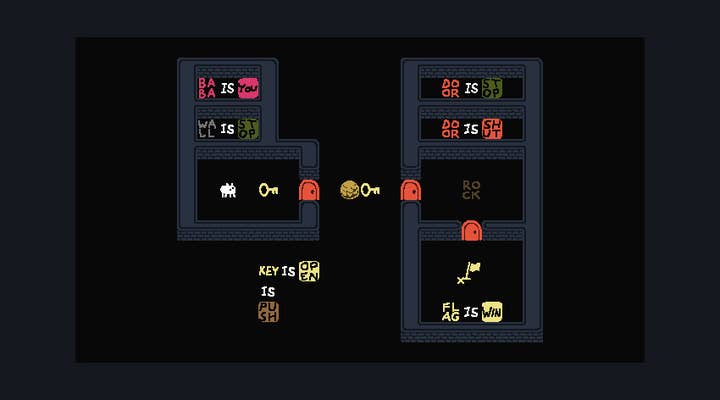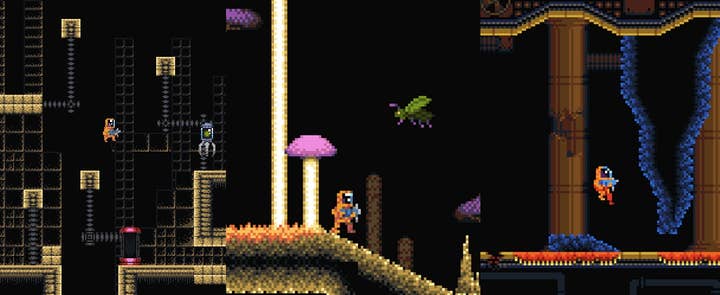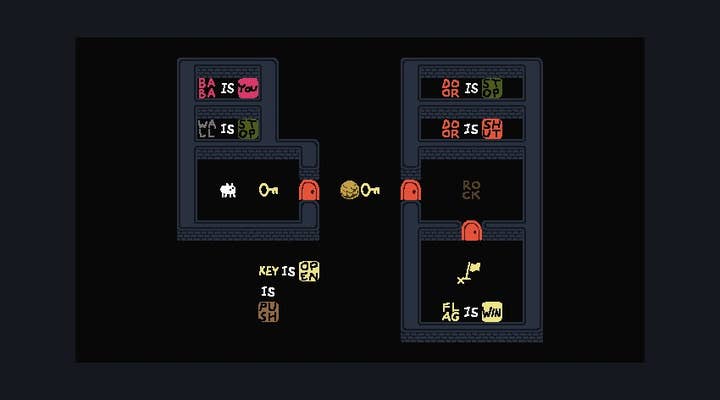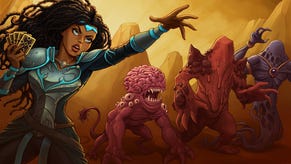Baba Is a tough act to follow
Arvi Teikari talks about following up the innovative Baba Is You with a "very traditional Metroidvania" and livestreaming development
It's been a little over a year since Arvi Teikari released the mind-bending puzzle game Baba Is You. And as tricky as some of that game's levels could be, they might pale in comparison to the difficulty of following up a critically acclaimed hit that took home a DICE Award for Outstanding Achievement in Game Design and the Game Developers Choice Awards for Innovation and Best Design.
Speaking with GamesIndustry.biz recently, Teikari says he's not expecting to get the same reaction with his next game. Or the game after that.
"I've been trying to tell myself and remind myself that it's extremely unlikely that whatever I do next, or whatever I do ever in my career, will be as successful as Baba Is You," Teikari says. "Unless I figure out something as novel as Baba Is You, my future games will have to be okay not being as successful. And I would really like to be fine with that."
As for what his future output will be, some of it is already lined up. First, he's working on a level editor for Baba Is You that he expects to release at some point this year. Beyond that, he's been working on Environmental Station Alpha 2 (tentative title), a sequel to his first commercial game and the project he shelved after making the earliest version of Baba Is You for the 2017 Nordic Game Jam.

While the innovative appeal of Baba Is You is instantly clear to many players -- it won that Nordic Game Jam over 147 other games -- ESA 2 is something of a longshot for something like the GDC Innovation Award.
"ESA 2 is a very traditional Metroidvania game," Teikari says, "not one that would get people saying 'Wow this is so innovative!' More like, 'Oh, this is another game in the genre that already has a lot of games, not very interesting but I might enjoy playing it.'
"I'd like to think that when that game releases and people say, 'It's not as good as Baba Is You because it's not ground-breaking, but it's fun' and then it gets a 6 out of 10 that I'll be able to say that's what I was expecting, that it doesn't have to be any better than that and I'm happy with it."
While casual observers might not see much new in the finished product of ESA 2, that sells short just how new the development experience for ESA 2 has been for Teikari.
Teikari says rolling straight from one game onto the sequel and deciding to livestream development led to "some really bad design decisions"
"In 2015, when I finished the first [Environmental Station Alpha], I had my first experiences with streaming around that time and I very quickly afterward decided I want to start making a sequel and I will stream the progress," he says.
That led to "some really bad design decisions," in part because he hadn't given himself enough time to really gather his thoughts on what to do for the sequel.
For example, Teikari thought improving the visuals of the game was a natural next step to take in a sequel. The original had used an 8x8 pixel tile size, so he figured he would up that to 16x16 for the sequel.
"That didn't really work out, not only because it was an exponentially greater amount of work for me, but also because I didn't really like the look of the game," Teikari says. "I had worked in a lower resolution for so long I had trouble adjusting to a higher resolution."
He scaled the tile size back to 12x12 and worked on the project that way for years, but the visuals still weren't working for him. Just recently, he went back to an 8x8 tile size.

The issues created by not giving his ideas time to take shape were compounded by the decision to stream development.
"I wasn't familiar with the phenomenon of streaming or how it feels to stream game development to an audience," he says. "I made some design mistakes as a result.
"If I streamed the boring development parts, people wouldn't be entertained, and I had this illusion that I needed to entertain people if I streamed game development"
"I felt that when I was streaming, I wanted to showcase the cool stuff. If I streamed the boring development parts, people wouldn't be entertained, and I had this illusion that I needed to entertain people if I streamed game development. It took me a long time to get over that concept. So I left some important things unfinished, and thought, 'Well I'll return to this later. I don't want to do this right now because I want to concentrate on the fun parts.' And that came back to kick me in the butt down the line."
As Baba Is You's development was wrapping up, Teikari says he made the decision to scrap almost everything he had done on ESA 2 and restart from scratch "so I would be able to avoid the problems I had created for myself over the two years I worked on ESA 2 before starting Baba Is You."
Where Baba Is You's development was marked by inspired motivation, ESA 2's extended development is being driven partly by a sense of obligation.
"Making the game is fun and I'm happy that I'm making it right now, but my point of view as a game developer has changed in such a way that if I was just making whatever I want right now, I might not be making ESA 2," Teikari says. "I might be concentrating on other projects I feel are more unique or something. But I do enjoy working on it, and I also feel an obligation to people who spent several years watching me make ESA 2 and other games. I would like to not disappoint those people by bailing on it."
If there's a lesson to take from Teikari's experiences, he's reluctant to be the one to say what it is. He's quick to acknowledge that he has had a number of privileges, and any advice he would give likely wouldn't apply the same way to developers in any other position. The closest to straight-up advice he offers is for developers to consider delegating some of the responsibilities they might have around launch.
"Every time when you release a game, there will be that crash"
"It was a lot of fun to make Baba Is You, the most fun I've had developing a game," Teikari says. "But every time when you release a game, there will be that crash. You might feel very excited and motivated about the project, but once you release it, it's very easy -- to me it almost feels inevitable -- that you will come back to the ground from that place of excitement and there will be obligations around the release and after release that aren't related to the fun parts of game development. The business part is always there obviously, but it will become even more important around the release."
When Baba Is You came out, Teikari says he was exhausted, "almost in a burnout state," taking months to tackle business decisions that should have been handled far quicker. He searches through an email folder of business matters he had to respond to and finds it contains more than a thousand entries.
"If you're making a game entirely on your own, especially if it seems like the game will be successful, it might be a good idea to make the release and business stuff someone else's problems,' Teikari says. "I've had a lot of help, but if you seemingly handle a lot of things on your own, it will be pretty rough mentally."
That's not to say he wants to give up control of those aspects of the business entirely. While Teikari is open to working with publishers on side projects when appropriate, he still plans to self-publish any of his "major" titles going forward (though he suggests he might hire someone to handle email or social media for his own sake).
That lines up well with one of the first things Teikari says in the interview, when talking about expectations to follow-up Baba Is You with something similarly innovative and acclaimed.
"It's obviously not the reason why I make games, that they should be successful," Teikari says. "I make them because I enjoy making them and I want to see people appreciate them. The economic success part of it shouldn't be a limiting factor."









